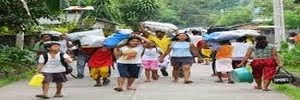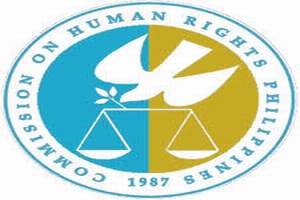links: http://www.un.org/apps/news/story.asp?NewsID=46857&Cr=south+sudan&Cr1=#.UsdMkc4sAgU
Evidence mounts of extra-judicial killings, rights abuses in South Sudan, UN reports
31 December 2013 – The United Nations peacekeeping mission in South Sudan (UNMISS)
today voiced grave concern over mounting evidence of gross human rights
abuses in the strife-torn country, including extra-judicial killings of
civilians and captured soldiers, massive displacements and arbitrary
detentions, often on ethnic grounds.
“I condemn in the strongest possible terms the atrocities committed
against innocent civilians of different communities by elements from
both sides during the crisis,” Secretary-General Ban Ki-moon’s Special Representative and head of UNMISS, Hilde Johnson, said. “There is no excuse for these terrible acts of violence. All perpetrators must be held accountable.”
UNMISS cited the discovery of large numbers of bodies in Juba, the
capital, and the Upper Nile and Jonglei state capitals of Malakal and
Bor. The conflict erupted in the world’s youngest country, which only
gained independence in 2011 after seceding from Sudan, 16 days ago when
President Salva Kiir said soldiers loyal to former deputy president Riek
Machar, dismissed in July, launched an attempted coup.
Mr. Kiir belongs to the Dinka ethnic group and Mr. Machar to the Lou
Nuer, and UNMISS said it sees evidence of the apparent targeting of
South Sudanese citizens on ethnic grounds. “This can lead to a perpetual
cycle of violence that can destroy the fabric of the new nation,” it
warned in a statement.
The Mission has several times previously called for an end to the
serious human rights violations. “Available evidence indicates that
atrocities are continuing to occur in various parts of South Sudan,” it
said today. “Many of these violations appear to be ethnically targeted.
Most of the more brutal atrocities are reported to have been carried out
by people wearing uniform.”
UNMISS has been collecting information every day since the crisis began
and pledged to continue “this priority task of investigating all reports
of serious human rights violations and collecting evidence and
eyewitness testimony in order to document such allegations.”
It reminded all parties of their obligation to protect civilians and act
in accordance with human rights and humanitarian law, and called on key
leaders to send strong public messages to their respective
constituencies insisting that the violence must stop, and that anyone
disobeying these orders will be punished severely.
Ms. Johnson welcomed yesterday’s decision of the African Union’s Peace
and Security Council to establish a commission to investigate human
rights violations and other abuses and recommend ways and means to
ensure accountability, reconciliation and healing among all communities.
“The UN stands together with all the people of South Sudan and demands
that all parties halt the violence with immediate effect,” UNMISS
stated, calling on all sides to open talks for a peaceful resolution of
their differences. “The leaders of all sides have a historic
responsibility to the future and people of this young country.”
The Security Council held a crisis meeting on South Sudan yesterday,
after which it issued a press statement demanding an immediate cessation
of hostilities and the full protection of civilians. It stressed its
determination to ensure that those responsible for human rights
violations be held accountable.
---------------------------------------------------
Central African Republic: UN warns children being mutilated amid ongoing turmoil
30 December 2013 – Attacks against children in the Central African
Republic (CAR) have sunk to a “vicious new low,” the United Nations
children’s agency warned today, saying that at least two children have
been beheaded, and one of them mutilated, in the violence that has
gripped the capital since early December.
“We are witnessing unprecedented levels of violence against children.
More and more children are being recruited into armed groups, and they
are also being directly targeted in atrocious revenge attacks,” said Souleymane Diabate, Country Representative for the UN Children’s Fund (UNICEF).
“Targeted attacks against children are a violation of international
humanitarian and human rights law and must stop immediately. Concrete
action is needed now to prevent violence against children,” Mr. Diabate
added in a news release.
UNICEF and partners have verified the killings of at least 16 children,
and injuries among 60, since the outbreak of communal violence in the
capital, Bangui, on 5 December.
CAR has been thrown into turmoil since Séléka rebels launched attacks a
year ago and forced President François Bozizé to flee in March. A
transitional government has since been entrusted with restoring peace
and paving the way for democratic elections, but armed clashes have
erupted again, and in Bangui last week, Christians and Muslims launched
reprisal attacks against each other in and around the city.
UN agencies have reported that the humanitarian situation in the country
is deteriorating, with at least 600 people killed this month alone, and
over 100,000 others driven from their homes in Bangui.
Mr. Diabate said that armed elements were accountable for taking
specific measures to protect children, including clear directives by
those in positions of authority within armed forces and groups to halt
grave violations against children.
“The orders must make clear that children must not be recruited into the
fighting, nor targeted,” stated UNICEF, which also called for the
immediate release of children associated with armed forces and groups,
and their protection from reprisals.
The agency also cited the need to prohibit attacks against health and
education personnel, and the use of civilian spaces such as schools and
hospitals for military purposes. Allowing safe, unhindered passage of
impartial humanitarian assistance was critical, it added.
UNICEF is scaling up relief efforts among displaced communities,
including the provision of safe water, sanitation facilities and medical
supplies, and setting up safe spaces for children.
----------------------------------------
Multiple emergencies pose great test of the global humanitarian system, UN official says
2 January 2014 – An unprecedented number of people are beginning
2014 either internally displaced or as refugees, the United Nations
humanitarian chief warned today, urging sustained support for millions
who have been driven from their homes by violence and bloodshed or
uprooted by devastating natural disasters.
“2013 was a real test of the global humanitarian system, and there is no
indication that 2014 will be any different,” said UN Emergency Relief
Coordinator Valerie Amos, briefing reporters in New York on the past
year, which was marked by the international community’s massive efforts
to ease suffering in war-torn Syria and typhoon-hit Philippines, and the
year ahead, which has opened amid sectarian fighting in both Central
African Republic and South Sudan.
“It is clear that the United Nations and its partners will be needed
more than ever,” she said, noting that just a little more than two weeks
ago, the Organization had launched its largest ever funding appeal –
nearly $13 billion – to reach millions of people with life-saving aid in
2014, with half of that sought for those affected by the deepening
crisis in Syria.
Tragically since then, inter-communal fighting has shattered the world’s
youngest nation – South Sudan – and bloody violence has spread
throughout the Central African Republic, where a worrying crisis has
been unfolding against a backdrop of abject poverty and a collapsing
State. “The world’s collective response capacity and resources are being
stretched to the limit,” she said, stressing that more funds will be
needed to address emerging needs.
In South Sudan, violence has driven an estimated 194,000 people from
their homes in a matter of weeks with more than 57,000 seeking
protection at UN missions.
Some 107,000 people have been reached with assistance, Ms. Amos said,
adding that the Office for the Coordination of Humanitarian Affairs (OCHA), which she heads, aims to reach over 600,000 people in the first three months on this year.
She expressed deep concern about ongoing disturbing reports of gross
violations of human rights and the lack of protection of civilians, “Aid
organizations need access to affected communities to provide shelter,
health care and clean water. People’s lives depend on this.”
In Syria, where over 100,000 people have been killed since the conflict
erupted in March 2011, Ms. Amos noted that the collapse of the country’s
infrastructure, ongoing targeting of civilians and militarization of
schools and hospitals remain ongoing concerns, with some 6.5 million
people displaced and more than 2.3 million seeking refuge in
neighbouring countries.
“We continue to stress the need for a political solution to the crisis.
Every day that passes leads to further deterioration of the situation,”
Ms. Amos said adding that the funding need is “unprecedented”.
On 15 January, Secretary-General Ban
Ki-moon is due to chair the second Pledging Conference for Syria,
hosted in Kuwait City by Emir Shaykh Sabah Al-Ahmad Al-Jaber Al Sabah.
Plans are also underway for the long-awaited international conference
aimed at achieving a political solution. The so-called Geneva II
conference is due to begin in Switzerland on 22 January.
On the Central African Republic, Ms. Amos noted that violence and unrest
continue against the backdrop of abject poverty and the collapse of the
State, with more than one of six residents internally displaced, an
equivalent of more than 800,000 people, and a half-million hungry.
“Aid agencies continue to scale up their response activities as fast as
security conditions allow but it has not been easy,” she said.
In Sudan, aid workers continue to face challenges accessing South
Kordofan and Blue Nile states, with limited access also to Darfur whose
crisis is now entering its tenth year.
Large-scale displacement is also a concern in the Democratic Republic of
the Congo (DRC) where 2.7 million people remain uprooted, 65 per cent
of them in the Kivu provinces alone.
The surrender of the M23 rebel group in early November last year raised
hopes of progress, “but security is volatile and the return of the
displaced remains an elusive goal,” Ms. Amos said.
In addition to displacement, aid workers in the country are grappling
with food insecurity. An estimated 6.3 million people do not have steady
access to food, resulting in half of all children under five years of
age in the country being considered chronically malnourished.
Similarly, in Somalia, where a fragile political landscape and rampant
insecurity continue to pose operational challenges for aid workers, 3.2
million people are in need of assistance with malnutrition rates topping
some of the highest in the world.
In Mali and eight other countries in the Sahel which are high on OCHA’s
agenda, around 16 million people are at risk of hunger due to fighting
and rapid population grown.
The UN relief arm is following a twin track approach in the region,
delivering food and other assistance to vulnerable people, while working
to strengthen the ability of the people and the Government to build
resistance and absorb future shocks as a result of drought and other
natural disasters.
Among other countries cited, Ms. Amos also noted the ongoing crisis in Afghanistan, Haiti and Myanmar.
She stressed that the reforms the UN put in place two years ago are
delivering real results, but more work is needed to bridge its different
elements - political, development, peacekeeping and humanitarian arms -
in a way which delivers strategic and sustained support.
UN Website
links:
OTHER HUMAN RIGHTS PROMOTIONS WEBSITES
PROTECTION AND PROMOTION OF HUMAN RIGHTS
-----------------------------------------------------------------------------------------------
------------------------------------------------------------
-----------------------------
------------------------------------------------------------
-----------------------------


























































0 comments:
Post a Comment